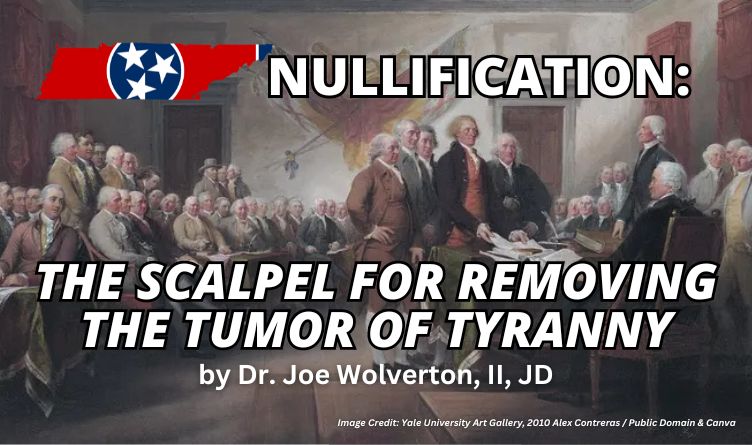Image Credit: Yale University Art Gallery, 2010 Alex Contreras / Public Domain & Canva
Submitted by Dr. Joe Wolverton, II, JD –
On Thursday, October 3, I had the honor of testifying before the Tennessee State Senate committee on State and Local Government during their summer study session, where I advocated for the sovereignty of the state of Tennessee and its right to nullify unconstitutional acts of the federal government.
As a proponent of state nullification, it is essential to correct the misconceptions and misinterpretations of the Constitution that are often used to undermine this foundational principle of what James Madison described as a union of states, each of which is “a sovereign body, independent of all others, and only to be bound by its own voluntary act.” (Federalist 39)
During my testimony, I addressed and refuted the recent opinion issued by the Tennessee Attorney General regarding a recent nullification bill, which asserts that nullification is “constitutionally infirm.” The Attorney General’s position is not only factually and legally flawed but also fails to respect the principles of state sovereignty and the constitutional compact that gave birth to our federal system.
Today, I want to walk through the key points I raised in my testimony and provide a robust defense of state nullification as a lawful and essential mechanism for defending our liberties.
State Sovereignty and the Supremacy Clause
One of the Attorney General’s central arguments against state refusal to carry out unconstitutional edicts of the federal government is that it violates the Supremacy Clause of the U.S. Constitution. He argues that states cannot nullify federal laws, claiming that such actions contradict the Constitution’s grant of supreme authority to federal laws. However, this interpretation fundamentally misrepresents the true nature of the Supremacy Clause.
The Supremacy Clause declares that only those federal laws made “in pursuance” of the Constitution are supreme. In other words, any federal action that exceeds the powers delegated to the federal government by the Constitution is not supreme and is, therefore, not binding on the states. The federal government cannot be the sole judge of its own authority; such a position would destroy the checks and balances built into our federal system. States retain their sovereignty and their duty to defend their citizens from unconstitutional federal overreach.
As I testified, the framers of the Constitution never intended the federal government to wield unchecked power.
James Madison, often cited as the “Father of the Constitution,” affirmed in Federalist 45 that the powers delegated to the federal government were to be “few and defined,” while the powers reserved to the states were to be “numerous and indefinite.” State nullification of unconstitutional acts of the federal government is entirely consistent with this constitutional principle, as it empowers the state of Tennessee to nullify any federal action that is not “in pursuance” of the powers granted by the states to the federal government in the Constitution.

The Founders’ Vision: A Compact Between Sovereign States
Our federal system was created through a compact between sovereign states. This means that the federal government is not an independent entity but rather an agent of the states, granted limited powers to serve the collective interests of the union. As such, the states are the final arbiters of the powers they delegated to the federal government.
This principle is deeply rooted in American history and legal theory.
In the Kentucky and Virginia Resolutions of 1798, Thomas Jefferson and James Madison clearly articulated that states have not only the right but the duty to nullify unconstitutional federal actions. The Constitution was never meant to be a one-way street where the federal government could do as it pleased, with the states forced to comply. The states are co-equal sovereigns, empowered to resist federal overreach.
As I explained to the committee, the principle of state nullification is akin to the principles of agency law, which govern the creation of the federal government. An agent—such as the federal government—cannot lawfully exercise powers beyond those explicitly granted by the principal, which in this case are the states. Any federal action that exceeds the scope of its constitutional authority is null, void, and unenforceable, as would be the act of any agent that exceeded the authority granted to it by its principal(s)!
Tennessee, as a sovereign state, has both the right and the obligation to refuse enforcement of such unconstitutional federal acts.
Nullification in Practice: Past and Present
Contrary to the claims made by the Attorney General, nullification is not a radical or untested theory.
In fact, it has been employed throughout American history to resist unconstitutional federal mandates. For example, the states of Kentucky and Virginia famously nullified the Alien and Sedition Acts of 1798, and Wisconsin nullified the Fugitive Slave Act in 1859, refusing to enforce federal laws that violated fundamental rights.
Furthermore, several states are currently safely still in the union despite having nullified federal regulations banning the sale of marijuana and raw milk. I’ve visited Idaho and purchased raw milk at the local grocery store, and I’ve seen people in Arizona buy marijuana with the same ease as buying tobacco.
As far as I know, Arizona, Idaho, and many other states with similar statutes nullifying unconstitutional federal overreach are still in the union, there are no wars in the streets, and there is no chaos causing insurrections or any other armed uprisings!
Tennessee has every right—both historically and constitutionally—to stand in defense of its people and reject federal overreach. Nullification is not an act of rebellion or secession; it is a constitutional safeguard.
As I testified, nullification is the scalpel with which states can remove the cancer of federal tyranny, preserving the healthy tissue of our republic. It is the peaceful, lawful remedy the framers envisioned to keep the federal government in check.
Misconceptions of Judicial Supremacy
Another flaw in the Attorney General’s opinion is his reliance on the doctrine of judicial supremacy, the idea that the federal judiciary has the final say in interpreting the Constitution. This doctrine is neither historically accurate nor constitutionally sound. Nowhere in the Constitution does it state that the federal judiciary has the exclusive authority to determine the constitutionality of federal actions. In fact, as co-sovereigns, the states retain the right to interpret the Constitution within their own borders.
Next, the legal maxim “Expressio unius est exclusio alterius” means that if, in a legal document, a list of things to be included as a class of things is made and something is left off that list, then that thing was PURPOSEFULLY left off the list! Supreme Court opinions are NOT included in the list of “supreme law of the land” in Article VI of the U.S. Constitution, therefore it was PURPOSEFULLY left off that list.
Additionally, as I pointed out during my testimony, the Supreme Court itself is not infallible.
It has made grievous errors in the past—consider the Dred Scott decision, which upheld the institution of slavery, or the Korematsu decision, which permitted the internment of Japanese Americans during World War II. If the states were bound to accept every federal ruling without question, these historical injustices would have gone unchallenged.
The Role of the States as Guardians of Liberty
Ultimately, the states serve as the last line of defense between the people and a tyrannical federal government.
The founders were deeply concerned about the potential for centralized tyranny, which is why they designed the federal government to be limited in scope and subject to checks by the states. When the federal government violates the balance of power, it is not only lawful but necessary for states to act as a corrective force.
As I reminded the committee, Article I, Section 2 of the Tennessee Constitution declares,“That government being instituted for the common benefit, the doctrine of nonresistance against arbitrary power and oppression is absurd, slavish, and destructive of the good and happiness of mankind.”
The people of Tennessee have entrusted their elected representatives with the solemn duty to resist federal overreach and defend their rights. Nullification is the constitutionally sound means by which Tennessee can fulfill that duty.

Conclusion: Defending State Sovereignty
The Attorney General’s opinion opposing nullification is constitutionally flawed and ignores the rich tradition of state interposition in the defense of the Constitution, the union it created, and the liberty it protects. Tennessee must not cede its sovereignty to an overreaching federal government.
By establishing a process for nullification of unconstitutional acts of the federal government, the state of Tennessee will reaffirm its role as a bulwark against unconstitutional federal power and protect the life, liberty, and property of its citizens.
We must remember that the federal government is not going to stop encroaching on our freedoms unless the states assert their rightful authority.
Nullification is the tool the founders gave us to preserve our republic and ensure that the federal government remains within its constitutional bounds. Tennessee must lead the way in standing up to federal overreach, and I urge the legislature to pass a nullification bill in defense of our state’s sovereignty and the rights of our people.
Watch the Summer Study Session on Nullification below:




11 Responses
Any update on this?
If you want to keep up to date on this effort please join tncss.substack.com. TN Citizens for State Sovereignty also has a website. tncss.weebly.com We are working and organizing to get support for this legislation when it is submitted again in 2025. We also will organize citizen petitions of nullification if the Assembly fails to do it job. You can read the legislation from the website (HB2795/SB2775)
Why is Tennessee attempting to reinvent the wheel? Why do we need yet another law when we have the Tenth Amendment to the Federal Constitution?
Because our legislators only do what they are supposed to do when we force them to do it. This law merely establishes a process in which to invoke nullification. There are 5 different ways and one of those ways is a petition from WE THE PEOPLE. The law states the Assembly cannot refuse to create a bill of nullification when we submit our petition. The bill does not go to committee it goes directly to the full floor of both the House and the Senate. In 2021 the full Assembly passed SJR9005 acknowledging nullification but of course it was only words. So we are giving them a process and if the Governor, Assembly, Judge, City/County does not nullify an unconstitutional mandate, law, rule, regulation, treaty or international agreement then WE THE PEOPLE will do it and that is why I created TN Citizens for State Sovereignty. We are working to get this bill passed and then we will be the watchmen on the wall to make sure they do there job or we will do it for them. I have county leaders in 35 counties so far so collecting the needed signatures for a WE THE PEOPLE petition of nullification will not be difficult. We also have 5 constitutional experts and 1 consultant from the 10th Amendment Center on board.
THANK YOU!
I’ve yet to hear a SOUND argument against it. I’m VERY afraid of those who oppose nullification.
They are the ones against jury nullification too.
https://misruleoflaw.com/2024/10/04/nullifying-modernity-and-common-sense/
A non attorney listening to this guy will easily think he knows what he is talking about, but the attorneys on the committee were appalled. As was this writer who did her own legal research on this…
Throwing out 250 years of jurisprudence is not logical nor reasonable NOR RATIONAL. These so called ‘experts’ want to disregard and rewrite an 1803 case that has stood the test of time, whether one likes it or not… by the way, an expert is someone in whom others in the same field depend upon for reference. These are not experts.
120 year ago SCOTUS determined from the Constitution they had the last word on whether a law is Constitutional or not. If not, then it must be adjudicated through the courts until it reaches SCOTUS…not liking their adjudications is one thing; thinking ‘we the people’ can overrule them is another…
The examples he listed are NOT nullification. They are resistance and non compliance. Raw milk and marijuana federal laws are still in force and can be enforced if they so desire no matter what laws the states make. Further, it is against the law for a state to make a law in direct defiance of federal law… If the legislators are not doing what they “should” then another law will not make it so.
This does not mean the states are defenseless. A state can not comply as long as there is no contract in force. And that means the levels of government must work together with citizens active and participating.
This movement is counter productive, it is a waste of time on an issue that has been addressed multitudes of times in the last century. Attempting to work with our representatives, help them, is a worthy act for all citizens. If we had that, there would be less problems to begin with. It is not easy, but it the best way. Getting angry with people who do not agree and creating division in the body is worse than counter productive, it is destructive.
Nullification does not repeal any law. So to infer that it does is dishonest. Nullification IS resistance and non compliance. Yes there is still a law against pot and raw milk but the states that have resisted have in fact invoked nullification. Dr. Joe Woverton IS a lawyer. And 5 of Mr. Pulliam’s esteemed colleagues that hold him in high regard all wrote articles stating that on the issue of nullification Mr. Pulliam is totally off the mark. So many lawyers look at your position which conforms with Mr. Pulliam’s position and feel he is totally wrong on this issue. We are not angry. We are stating historical facts. So when we write in disagreement with your position we are creating division but when you do it that is ok?? You talk like the leftists talk. If a federal law is unconstitutional it is the duty of the states to refuse to comply. Do you really think that after our founders wrote the Federalist Papers and the Bill of Rights to insure the states would have the final say and that the federal government had VERY limited legislative powers that they wanted the Supreme Courtsto have the final say?? That ideology is totally anti-constitutional. During the Summer Study Mr. Cobble read a statement from the Dobbs hearing in which Justice Sotomayor stated during Dobbs: (partial statement) “There is not anything in the Constitution that says that the Court, the Supreme Court, is the last word on what the Constitution means.” Assuming the states and the people of the states were going to hand over their destiny to a few people in black robes is the same as saying the new King exchanged his crown for a black robe. That flies totally in the face of what they wanted and what they promised the states and the people of the states in order to ratify the Constitution. You may be willing to hand over your freedom to the courts but any American that cherishes our God given right to freedom is foolish to do so and violates the entire intent of the Bill of Rights (and the preamble), The Constitution, The Federalist Papers and the writings of our founders. “On every question of construction, (Let us) carry ourselves back to the time when the Constitution was adopted, recollect the spirit manifested in the debates, and instead of trying what meaning may be squeezed out of the text, or invented against it, conform to the probable one in which it was passed.” Thomas Jefferson
Any attorney who wants to be called “doctor” is a pompous fool more highly impressed with himself…he is a JD, an attorney. Not a PhD, and not a medical doctor.
That is probably the dumbest thing I have read in years. You do not have to be a medical doctor to have DR. in front of your name.
Wake up Tennessee…..https://www.tiktok.com/@tenthamendmentcenter/video/7425706096611888427?_r=1&_t=8qXuIv71cmg